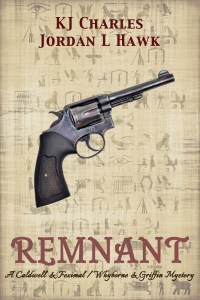K.J. Charles's Blog, page 14
February 17, 2015
Jackdaw release day!
Just a quickie to say that Jackdaw is here, should you be into chaotic criminals with unusual magical gifts, ex-lovers with a serious grudge, vengeful law enforcers, Cornwall, rugby-playing heroes, villains trying to go straight (as it were), or people who read Dickens.
For those who want a bit of extra stuff…
Graphic novel prequel by Lyudmila Tsapaeva here.
Blog post on Cornwall, with pictures and extract, here.
Blog post on sympathy for villains, with giveaway, here.
Blog post on how to write a convincing redemption arc here.
Book here: Publisher, Amazon UK, Amazon US
Five-star reviews at Sinfully, My Fiction Nook (spoilers), Scattered Thoughts and Rogue Words.��
The first book in the Charm of Magpies series, The Magpie Lord , is on special offer across all retailers at the time of writing, at 99c and local equivalents, so if you’re not sure, now is the time to try it for cheap. Amazon.com
My Facebook group can be found here, if you like in depth book chat, teasers, and early looks at stuff.
Right. I have launched Jackdaw, which is part of my Victorian paranormal Charm of Magpies series. I have finished book 1 of my Society of Gentlemen trilogy, where Regency exquisite meets Radical revolutionary. I now need to jump back into a different Victorian paranormal world for The Secret Casebook of Simon Feximal. This is my brain right now:
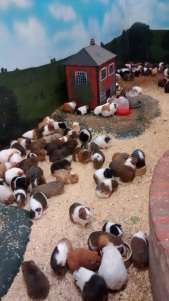
See you on the other side.
__________________________
If you stop running, you fall.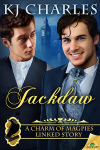
Jonah Pastern is a magician, a liar, a windwalker, a professional thief���and for six months, he was the love of police constable Ben Spenser���s life. Until his betrayal left Ben jailed, ruined, alone, and looking for revenge.
Ben is determined to make Jonah pay. But he can���t seem to forget what they once shared, and Jonah refuses to let him. Soon Ben is entangled in Jonah���s chaotic existence all over again, and they���re running together���from the police, the justiciary, and some dangerous people with a lethal grudge against them.
Threatened on all sides by betrayals, secrets, and the laws of the land, can they find a way to live and love before the past catches up with them?
This story is set in the world of the Charm of Magpies series.

February 13, 2015
Jackdaw: Valentine’s Day. The Graphic Novel.
My new book Jackdaw releases on 17 February.�� And I have the mother of all teasers for you.
“Jackdaw: Valentine’s Day” is a Jackdaw prequel, drawn by the magnificently talented artist Lyudmila Tsapaeva. It features our heroes Ben and Jonah, who appears in the previous book Flight of Magpies, and as you will see, things are going swimmingly for them.
Individual pages follow, and there’s a pdf link at the bottom for download.
Happy Valentine’s Day from me and Lyudmila. I hope yours is better than Ben and Jonah’s…
________________________________
If you stop running, you fall.
Jonah Pastern is a magician, a liar, a windwalker, a professional thief���and for six months, he was the love of police constable Ben Spenser���s life. Until his betrayal left Ben jailed, ruined, alone, and looking for revenge.
Ben is determined to make Jonah pay. But he can���t seem to forget what they once shared, and Jonah refuses to let him. Soon Ben is entangled in Jonah���s chaotic existence all over again, and they���re running together���from the police, the justiciary, and some dangerous people with a lethal grudge against them.
Threatened on all sides by betrayals, secrets, and the laws of the land, can they find a way to live and love before the past catches up with them?
This story is set in the world of the Charm of Magpies series.

February 12, 2015
Confessions of an Irritable Romance Novelist
Someone wrote an article (‘Confessions of a Failed Romance Novelist’) for the National Post on how she tried to knock out a romance novel to make lots of money. If you are a romance reader/writer, you can save time by screaming and throwing something at the wall now, rather than reading it.
Edited highlights follow. Get your bingo cards out.
Comes from a position of ignorance and contempt:
���From what I gather the [typical romance novel] plots are simple and the characters��� emotional lives not terribly complex. Also, the sex or some sex act needs to happen way before the 100 page mark,��� [my agent] wrote me.
[Note to author of article: Your agent is terrible. Get a new agent.]
Does no research before writing:
I attempted to revive [romance career after publishing the book] by borrowing some Harlequins. I wanted to surprise myself; maybe I would actually like the real thing. Maybe I would be able to imitate it.
Is better and more intellectual than dumbo romance readers:
I decided the world was ready for a book about love with many subplots, dealing in experiences more complicated than a sudden, early outburst of butterflies. ���
[used to read Harlequin as a tween but] I read Lolita for the first time and my literary tastes were irrevocably ruined.
Feels compelled to make gratuitous ‘romance writers are fat and ugly’ snipe:
I put on my ugliest glasses, squished my face into my hand to affect a triple chin, and took a picture of myself [for the fake author persona].
Disdains the lively and committed community of readers, reviewers and writers:
I started befriending people like some crazy creep, initially by joining groups that dealt with romance writing and reviewing. In three weeks, I racked up more than 1,000 friends ��� I didn���t have the time to engage with other fake people. What I learned from my friend and from Facebook, the romance-novel writing community required a sense of mutuality: you review them and they review you.
[For the record, I am aware backscratching reviews happen. I have never been approached by anyone to request this. Maybe nobody likes me.]
So anyway, this book, written with contempt for and ignorance of the genre, didn���t sell. Shocker.
I used to edit at Harlequin Mills & Boon. Every editor had a teetering pile of romance slush submissions two or three feet high by her desk, not to mention the unclaimed five-foot mounds surrounding the photocopier. On Friday afternoons, when I felt too lazy to edit, I’d sit there and power through two feet of people’s hopes and dreams at a time. Now, with slush, what you most want is a brilliant, perfect book that you can carry in triumph to an editorial meeting. Second is a flawed yet excitingly redeemable MS. Third preference is something you can reject on sight, without further ado. Seriously, there is a reason we don’t send everyone a personal letter. The piles are big.
(‘Reject on sight’ may sound unfair, but you develop a knack. An agent was famously asked if he could really judge a MS based on just three chapters. He replied that you can tell if a MS is no good based on three chapters, often one chapter, sometimes the first page, occasionally the covering letter, and, in extreme cases, the envelope. This is 100% true, as any experienced slush pile reader will testify.)
I saw so many ‘knock it out for the money’ submissions in the slush pile. So many clich��d, spark-free, lifeless, lazy, dull, grating, cranked-out MSS that someone had the unmitigated gall to think ���would do for Mills & Boon���, without knowing the trade, or the market, or the readership. With the very natural desire to make money by writing, but completely lacking the bit where the author wanted to write the book, or had any gift/inclination for doing so.
I loved those submissions. Adored them. I could drop in the preprinted rejection slip after reading one single paragraph, and that was another slush knocked off!
And that’s what I see when I read these ‘I tried to write a romance’ pieces. Authors who wouldn’t get a single full page of a MS read by a work-dodging editor on a Friday afternoon. I mean, seriously, if you’re going to be shallow and money-grubbing, at least do it well.
There is a mildly insightful line in this article:
But the work of creative writing is something else, it seems. I have to believe in it, non-cynically, otherwise who is possibly going to believe me?
This is true, if obvious. Romance is a genre powered by emotion. Authors can and should treat writing as a business. But the business of romance is to get endorphins flowing, hearts pounding, tears starting, pages turning. A romance author who can’t do that is as much use as a thriller writer who can���t kick off the adrenalin response, or a horror novelist who can���t pry into your limbic system and set off the shudders. And you cannot write real, convincing emotions if you���re knocking out a cynical exercise by numbers in a spirit of uninterested contempt.
So if you intend to sit down and write a bad book in a spirit of greed and ignorance, make it a hard SF or conspiracy techno-thriller, okay? It won’t be any easier or better, but I won’t ever know about it because I don’t read them, and that will save me a lot of irritation.
_________________________________
KJ Charles is a romance writer and freelance editor. Jackdaw is out on 17 February.
If you stop running, you fall.
Jonah Pastern is a magician, a liar, a windwalker, a professional thief���and for six months, he was the love of police constable Ben Spenser���s life. Until his betrayal left Ben jailed, ruined, alone, and looking for revenge.
Ben is determined to make Jonah pay. But he can���t seem to forget what they once shared, and Jonah refuses to let him. Soon Ben is entangled in Jonah���s chaotic existence all over again, and they���re running together���from the police, the justiciary, and some dangerous people with a lethal grudge against them.
Threatened on all sides by betrayals, secrets, and the laws of the land, can they find a way to live and love before the past catches up with them?
This story is set in the world of the Charm of Magpies series.

February 6, 2015
The Still Small Voice of Doom: feeling flaky about your MS
I finished my MS the other day. I tend to edit as I go, so it was fairly clean. Everything had gone as per the synopsis. And I’d finished early. Yay! (I have four deadlines this year, I need to get on).
I told Mr KJC I’d reached The End. He said, ���So have you sent it to the editor?��� I said, No, I’ll send it to beta readers first. He said, ���Well, have you sent it to them?��� I said, Not yet. I’ll do that now.
I sent it to my beta readers. I twitched. I fretted.
Mr KJC said, ���Why are you fretting?��� I said, I’m not fretting.
Mr KJC said, ���Why don’t just you send it to the editor, whose job it is to read your MS?��� I said, I want to do some pre flight checks. Make sure the timeline’s okay. See if the readers spot anything.
Mr KJC said, ���I’m pretty sure editors do that. I’ve been married to an editor for a decade, I know this.��� I said, Yes, well, it’s my first book with a new publisher. I’m just being tidy.
Mr KJC said, ���Are you wanting to make sure Teacher doesn’t tell you off?��� I suggested he might shut up.
Then one of my beta readers texted me and said she liked it but wasn’t sure how the ending fitted the story. And I nodded and went about my business doing other things, and three days after that, I sat at my desk and said aloud, ���Of course it doesn’t bloody work.���
It didn’t work. It didn’t work (since you ask) because it was making a big dramatic number out of an insufficiently significant plot strand, because it didn’t weave in the other main plot strands, because it ignored the Big Massive Existing Threat that touches on the entire cast of the whole trilogy in favour of a small localised threat that actually the heroes had already confronted successfully. It was, structurally, crap.
And I knew it.
That’s why I was finding all kinds of reasons not to do what you do with a finished MS, i.e. send it to the editor. Because it wasn’t finished, and I knew it wasn’t finished, but I had typed The End and I wanted it to be finished, and so I was ignoring the Voice.
You know the Voice. The one in your head quietly going, um, not really sure that’s…hey, aren’t you just jamming that in…what about that abandoned strand…are you sure that fits there? The one that niggles at that one little line every time you pass over it: are you just going to let this sit here? The one that is soft and mild and persistent and will not go away.
I’m not talking about the grating voice that says You can’t write books, who do you think you are? and Why aren’t you doing something better and more important, you loser? I mean the persistent little niggling wobbly-loose-tooth Voice that you don’t even really notice, except that you keep telling yourself, Sure the ending’s fine and Yeah, I can retcon it, build it up in editing and Well, it’s just a different sort of plot structure, that’s all, and That’s just a detail, tidy it up later.
The Voice talked to me a lot during the doomed first version of Magpie 3 where I ended up dumping 30K words. Hello, old friend, we meet again.
Thing is, though, the Voice knows its business. The ending was wrong, sure. But when I went over the MS and picked up the other little tiny points that the Voice had been niggling and nibbling and chewing at all along, they slotted together like jigsaw pieces to form a picture of a better ending. One that ties in the key themes to become proportionate and relevant, and which will do a hell of a lot more towards the two linked books. It’s pretty obvious this should have been the ending all along (duh), and the Voice was itching at me to see that, but I had an apparently perfectly good synopsis and a deadline, so I ignored it. More fool me.
One day I will listen to the Voice while I’m writing, rather than before I reach the end of the draft. One day. Meanwhile, the following:
If you’re feeling niggled at while you write, find a trusty beta reader to read the incomplete MS. That will help keep you on track and it’s always useful to have people’s thoughts on where the story is going.
Small pointless details that niggle at you are probably not small and pointless after all. Listen to your subconscious.
We all feel that this is the worst MS ever at some point. Ignore that feeling. But if you keep on thinking about/circling round/justifying something to yourself, especially if it’s specific rather than general self-doubt, you might as well face up to it now.
If you’re actively finding reasons not to send a finished MS off, it’s time to go hunting for the bits that made the voice say, Ummm…
Editors can fix this stuff. If you have an in-house editor, ask for help. If not, and you can stump up for a development editor, that’s what we do. Even if we’re not, apparently, fantastic at doing it for ourselves.
________________________________
KJ Charles is rewriting. Jackdaw is out on 17 February.
If you stop running, you fall.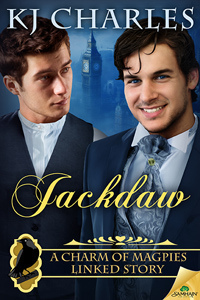
Jonah Pastern is a magician, a liar, a windwalker, a professional thief���and for six months, he was the love of police constable Ben Spenser���s life. Until his betrayal left Ben jailed, ruined, alone, and looking for revenge.
Ben is determined to make Jonah pay. But he can���t seem to forget what they once shared, and Jonah refuses to let him. Soon Ben is entangled in Jonah���s chaotic existence all over again, and they���re running together���from the police, the justiciary, and some dangerous people with a lethal grudge against them.
Threatened on all sides by betrayals, secrets, and the laws of the land, can they find a way to live and love before the past catches up with them?
This story is set in the world of the Charm of Magpies series.

January 26, 2015
The Secret Casebook of Simon Feximal
(This isn’t a promo post as such because the book’s not out till June. But I’ve had a lot of questions on Twitter/GR/here about this book, so I wanted to put the answers in one place!)
Backstory. Last year I wrote a short story called ‘The Caldwell Ghost’ for a Halloween anthology. It was set in the late Victorian period, with a Holmes/Watson-like relationship between Simon Feximal, ghost-hunter and occult detective, and Robert Caldwell, journalist and sidekick who narrates the stories. The premise of the tale was that Robert and Simon have been publicly colleagues and secretly lovers for twenty years, that in writing Simon’s adventures for a Victorian audience Robert has systematically written himself out of his own life, and that he has at last decided to tell the truth.
This is how the story begins:
A note to the Editor
Dear Henry,
I have been Simon Feximal’s companion, assistant, and chronicler for twenty years now, and during that time my Casebooks of Feximal the Ghost-Hunter have spread the reputation of this most accomplished of ghost hunters far and wide.
You have asked me often for the tale of our first meeting, and how my association with Feximal came about. I have always declined, because it is a story too private to be truthfully recounted, and a memory too precious to be falsified. But none knows better than I that stories must be told.
So here is it, Henry, a full and accurate account of how I met Simon Feximal, which I shall leave with my solicitor to pass to you after my death.
I dare say it may not be quite what you expect.
Robert Caldwell
September 1914
It was meant to be a one-off but my imagination was caught by foul-tempered, taciturn Simon, and I liked doing Robert’s voice. I wrote another story, Butterflies, which is free on Smashwords, to continue the tale.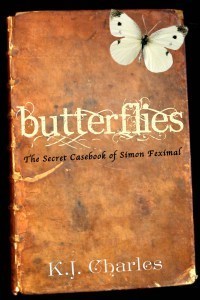
At this point, Jordan L Hawk and I realised we were both doing late nineteenth-century occult detectives on opposite sides of the Atlantic. There was only one thing for it: Jordan’s Whyborne and Griffin had to stop over in London for a quick adventure on their way to Egypt for their book Necropolis. We called the resulting co-written free story Remnant, and it placed second in Best Free Story in the Goodreads MM Readers Choice Awards last year.
Now, Necropolis is set in 1899. That meant I had to jump forward five years in Simon and Robert’s timeline to have them meet Whyborne and Griffin. It turned out as I wrote that a lot had changed. Robert now has a mysterious bit of metal embedded in his hand, a nasty scar under his eye, and a lot of grey hair. The ghost-writing on Simon’s skin is working very differently. They’ve been in the wars.
A lot of people have asked about this–what happened in the intervening years, where is the story between Butterflies and Remnant, what’s the deal? Well, it’s been in my head, and now it’s coming out, and, for starters, get a load of this cover by Kanaxa.

FAQs
So is this a novel?
No. It’s a collection of short stories–some closely linked so they form a continuing narrative over days and weeks, others standalone episodes–covering various parts of Simon and Robert’s life.
I’m not sure about short stories…
No, well, me neither. But that’s just how this had to be written.
What period does it cover? Are we going to find out about the stuff in Remnant?
It starts with ‘The Caldwell Ghost’ and Butterflies, and plays out the full story of Simon and Robert getting together. Then we cover various other incidents–how Robert got his scar, the cartouche we see in Remnant, a particularly evil enemy–all the way to the end.
Um…that sounds a bit ominous.
/cackles/
No, seriously.
Oh, come on, have I ever let you down?
Well–
Apart from then.
Apart from then, no. Fine. Is this going to be sinister?
Hell yes. High level of spooky magic, brooding evil, ghosts, curses, cults, plots, and the creepiest villain I have ever written.
I object to depictions of devil worship, spirit communication or tampering with the occult. Should I buy this book?
No. Or, yes, because I like royalties, but don’t read it.
Is ‘The Caldwell Ghost’ currently available separately?
No, it’s not. It will be included in the book, which is much better value for money anyway, so hang on. You can still get Butterflies and Remnant for free
So, details?
The Secret Casebook of Simon Feximal is due for publication with Samhain in June 2015. I dare say I will mention it again before then.

January 15, 2015
What’s Good For You: ‘detoxifying’ reading
I am annoyed, and I am disappointed.
Scholastic, the huge global children���s publisher who do, among other things, Harry Potter in the States, have a blog. And on their blog they had a post about doing a ‘literary cleanse’, which is what you���d call ‘throwing out books’ if you weren���t desperately hanging your monthly blog post on a New Year���s Resolution hook.
So this ���literary cleanse���, in the way of overstretched metaphors, involves ‘detoxifying’ your life to make it ‘healthier’. And what genre of book do we find exemplified as the filthy junk poison that the author needs to eliminate? No, go on, you have one guess.
from this day forward��I am officially strict in my literary screening process. I’ll think long and hard about what I want to read in the first place, and if it’s not good for me (ex: See’s Candy catalog, trashy romance novel), it’s out. (Source)
Now, you may argue that the author means only trashy romance novels and not the good ones, but let���s be honest: she doesn���t. Trashy is a word that gets attached to romance like brave to any celebrity who���s been slightly poorly, or renowned to curators being murdered in the Louvre. Romance novel=trashy romance novel. Anyone who cares about the genre wouldn���t have used this example because they���d be tired of being kicked in the teeth.
The author is of course entitled not to read romance, or to feel it’s bad for her, just as she is entitled to toss out casual dismissals of any genre she likes. I think it’s more intelligent to criticise a specific book than to dismiss a whole genre, but whatever, it’s a throwaway line in a throwaway post, who cares. What bothers me is to find this kind of thing on a children���s publisher’s platform, and here���s why.
The thing about children���s publishing is, it cannot be worthy or didactic. We���ve been through that. Children need to read books that are the kind of thing they want to read, and that may not be what a well-meaning adult considers ���good for you���. I hate Horrid Henry and the oeuvre of Jacqueline Wilson with every fibre of my being, but my kids go through them like maddened locusts, and every book improves their reading skills, vocabulary, reading fluency, joy in picking up a book.
Scholastic know this. You can tell they know this because they publish Rainbow Magic in the US. Brace for pink.
Here is what Scholastic have to say about Rainbow Magic:
Rainbow Magic is a delightful way to boost literacy. The predictable series plotlines gently stretch reading skills, allowing children to develop their fluency and speed in a fun and familiar context.
Even the publisher says it���s predictable. Oh my God, is it predictable. We must have had fifty of these pass through our doors, and (aside from the first seven, which are actually good), every single one was identically plotted, repetitive to the point of brain death, and utterly unchallenging.
My daughter read and reread these things, her literary security blanket when she was coping with starting school. She�� started to develop critical faculties off their pink-foiled backs (���Why do the goblins always hide the stolen magical objects where Kirsty and Rachel live?���) and eventually got bored and moved on without regret. She is now seven with a reading age of 14, so I’m pretty sure they didn’t rot her brain. I never want to encounter Bertha the Barrel-Scraping Fairy again, but these books were worth every penny and every minute for her.
These books are fun and pleasurable for kids. Not for anyone else, sure, but that’s the point. Scholastic publish series after series of stuff that any tweedy literary critic would pick up using tongs because they know bloody well that there is a massive value in reading for pleasure. They know readers often need a sense of familiarity and security. They know that the book world is wider than the Times Literary Supplement would have you believe. They publish stuff that their readers want to read, not just to make money, but because the health of the entire book world depends on people learning to love stories and read voraciously.
So why the hell would a publisher that knows about the importance of fun, and familiarity, and story, and reading for pleasure, casually publish a swipe at an adult genre that offers the same thing?
Why can���t adults read for pleasure? What exactly makes romance (or fantasy, or YA, or implausible conspiracy thrillers) ���trash��� as a genre? I’m not just defending the genre books that are brilliantly written and well executed here, legion though they are. Even the most routine, uninspired, ‘trashy’ series product can have value to readers who want that sort of book right then–just like Scholastic’s routine, uninspired Rainbow Magic series product does.
It’s book snobbery. It’s the didactic, dictatorial impulse that says ‘Take away Rainbow Magic and give that child The Water Babies!’ The urge to tell people what to read, the urge to dictate what���s ‘good for you’. The attitude that can’t simply say, ‘I will read something else,’ but has to frame it as ‘This stuff is junk and I look down on you for it.’ That isn’t how anyone who cares about reading should talk about other people’s books.
Let readers have the ‘joy of reading’, as the tagline on the Scholastic website has it, without sideswiping their tastes, whether they’re adults or children. Because if you ask me, a habit of patronising, belittling or casually sneering at other people���s pleasures is a lot more toxic than reading genre fiction can ever be, and probably more likely to turn people off reading at all. And I don’t want my book-gobbling children growing up with that.
_______________
KJ Charles used to edit children’s books and now writes award-winning romance. Jackdaw is coming in February.

January 10, 2015
Speech is free and silence is golden
Silencing is generally considered a bad thing. Which is quite right, considering how many people still have to fight for their voices, and demand to be heard. It is not okay to silence people. That should go without saying.
The problem is, it seems like very little can go without saying any more. The right to free speech is huge and crucial, so crucial that people die for it. But we do also have a right to silence. And I am profoundly disturbed by the idea that an absence of speech should be denied, interpreted or condemned.
I’m specifically thinking of the way members of a group (or at least some groups) are expected to denounce a member who behaves badly, or be tarnished by the association. Thus, there seems to be an idea that all Muslims, in general and particular, should denounce the Charlie Hebdo murders. (There are 1.6bn Muslims in the world. This is going to clog up Twitter something rotten.) Anyone who spends any time on the internet or reads the news will be able to supply their own examples, large or small. “There were calls for X to condemn Y…” “Are you seriously okay with what she said? Well, why haven’t you said anything then?” “I can’t believe that anyone who cares about Z wouldn’t speak out!”
I am bang alongside people condemning bad behaviour, obviously. I start to feel uncomfortable when people demand other people should join them in��condemning bad behaviour (especially since bad behaviour usually isn’t as clear cut as mass murder, and it’s not unknown for crowds to be wrong). And I get very worried indeed when not denouncing an offence is treated as tacit support for that offence–so that if you don���t join in the denunciation of someone who said or did a thing, that suggests you agree with the thing they said or did. So-and-so hasn’t said anything? Well, that looks bad… (It is, incidentally, noticeable that the demand to speak out never seems to be satisfied. Not enough people have denounced the offence, or they haven’t done it strongly enough, or they spoke out earlier but they ought to do it again right now because, you know, my outrage.)
There are plenty of reasons individuals might not ‘speak out’ against something that aren’t, “Hey, an atrocity, cool!” Sometimes people haven’t heard about whatever it is. Sometimes they think that an Internet status update is not a worthy response to, say, genocide. Sometimes they have a nuanced opinion that will take a while to process, or they haven’t worked out what their opinion actually is yet, or they don’t feel they know the whole story. Sometimes they feel that their opinion doesn’t need to be publicly stated, whether because they aren’t actually responsible or involved, or because it’s just not that interesting. Sometimes they don���t have an opinion at all.
Sometimes people might be afraid to speak for personal or professional reasons, and that fear might be real and valid. Sometimes they might have been advised that ���anything you say will just make it worse���, and all too often that���s true.
Some people don���t want to be drawn into the argument in the first place. That’s a valid choice that deserves respect. We aren’t obliged to engage with every topic, even when we feel strongly about the subject, and we’re probably happier when we don’t.
Sometimes people actively choose to shut up. That might be because they’d rather treat an outrage with silent contempt or deny it publicity. The most irritating and effective thing you can do to a run-of-the-mill troll is ignore them. But also, sometimes people in privileged groups need to shut up and let others talk, amplify their voices rather than adding our own, clear a space for marginalised people. If our own speech is valuable, everyone else should get a go too.
Sometimes people would rather listen than talk. That’s actually quite important in a conversation. My grandmother used to say, ���This is why you have two ears and one mouth,��� and, like all grandmothers, she was right.
Be silent or let thy words be worth more than silence. (Pythagoras)
Nobody should be silenced. Actively recruiting popular support can be a huge force for good, as long as we don’t preemptively damn those who don’t sign up. But if we value speech, we should also respect the choice to be quiet, whether people are listening, thinking, or choosing not to engage for any of a million reasons. Silence is not consent. And insisting that people speak or be damned is a way of controlling their voices–which seems to me the opposite of what free speech is about.
After all, it���s not like the Internet is going to run out of opinions any time soon.
_______________
KJ Charles is rarely short of opinions, truth be told. Look out for Jackdaw, coming in February, and A Case of Spirits, a free story available now.��

January 4, 2015
Demon Drink and Another Free Story
So there is another free Charm of Magpies short story available. Another! There was one last month!
Here’s what happened. Samhain, my publisher, at that time published print a year after the electronic version. They have a minimum length at which a book can go into print, and A Case of Possession, Charm of Magpies #2, squeaked in a little under that. Now, I really wanted it in print. Because print is fun to have, but also because it’s dedicated to my friend Caroline, and she informed me that if she didn’t get a print copy to show people, I’d be in serious trouble.
I have been friends with Caro for thirty years. I know what trouble means. So I suggested to Samhain that I could write a bonus story to bring the book up to print length. They went for it, to be released electronically at the same time as the print book (hence its appearance out of series order), and even said it would have its own cover by Lou Harper. Now all I had to do was write something.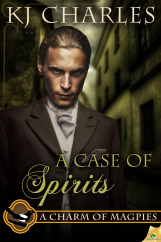
This was less easy than you might think. I was hopelessly stuck on Magpie 3 at this point, so stuck that I’d actually written an entire and totally different novel that came into my head while I was fretting (Think of England, the world’s longest example of ‘oh look, a squirrel’). So coming up with a story that fitted into a series arc that I wasn’t sure about…whimper.
I had no idea what to write.
I went for a drink with Caro and her bloke Simon, and ventured a quiet murmur of mild complaint (which I may have phrased as ‘your bloody story is doing my head in, you utter moose, now buy me a drink’). Simon asked about what I was writing. I spoke of Victorian London. And Simon, who works in the drinks trade, asked, did I know about the black cat signs they used for bootleg gin?
Tell me more, I said.
Well. It seems that the very many brewers of bathtub gin would identify their product for sale by a black cat, as a universal sign of ‘Get very cheap drink here!’, in the same way that a red and white pole indicated a barber, or three golden balls indicated a pawnbroker. I haven’t been able to find any very serious sources on this, but here’s one version as presented by Hayman’s, gin manufacturer:
Back in 1736, one Captain Dudley Bradstreet lucked into both a piece of London property and a stock of gin. Bradstreet hung a sign depicting a painted cat in the window and let it be known that doses of sweet mother’s ruin could be had at the address. “Under the cat’s paw sign was a slot and a lead pipe, which was attached to a funnel inside the house,” reads a history put together by Hayman’s. “Customers placed their money in the slot and duly received their gin. Bradstreet’s idea was soon copied all over London. People would stand outside houses, call ‘puss’ and when the voice within said ‘mew,’ they would know that they could buy bootleg gin inside. Very soon Old Tom became an affectionate nickname for gin.”
It is, at the least, a cool story. And it got me thinking. It got me thinking about what drives people to drink, to remember and to forget, about cold dark wet Victorian streets. I started thinking about what my characters had that they might want to forget. A plot came swimming out of the depths, a piece depicting one of Stephen’s justiciary cases that turns personal…
And with it came a revelation about what two of my secondary characters had been up to offstage while I was writing the main story.
I realise that this is the kind of thing that makes non-writers roll their eyes and mutter, “Obviously they aren’t doing things behind your back, they’re made up. By you.” All I can say is: Sorry, that’s how it works. I realised when I wrote this story that two characters had embarked on a relationship. That realisation isn’t pivotal to A Case of Spirits, as such…but it gave me the handle on Magpie 3 that I needed.
Suddenly I could see the shape of Magpie 3. I could see how the stories interlocked and what was driving everyone on, and what was piling strain on the main relationship. The whole book that became Flight of Magpies clicked into place. It worked. Thanks to Caroline (by accident) and to gin.
Story of my life, basically.
________________________________________________
A Case of Spirits is available from 6 January from Amazon and all the usual places. It’s free (because it’s free with the print book) and comes between A Case of Possession and Flight of Magpies. It’s more a mood piece than anything, and has no series spoilers so feel free to sample if you haven’t read the others. I hope you enjoy it!
A Charm of Magpies reading order:
Interlude with Tattoos (free)
A Case of Spirits (free)
Feast of Stephen (free)
Jackdaw (coming in February, and a linked story)

December 18, 2014
Free Charm of Magpies short story
Ho ho ho and sleighbells on top. This will be my last blog post of the year unless anything interesting happens, so merry Christmas and happy holidays, one and all.
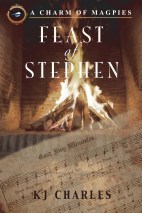 Since it’s the ‘free stuff’ time of year—I mean, the season for giving—I have a little something for you. It’s Feast of Stephen, my long-promised Magpie story, a short coda to Flight of Magpies, in which Crane and Stephen finally make it to their Christmas getaway. There is storytelling, exchange of gifts, and a bit of magical smut (you’re welcome).
Since it’s the ‘free stuff’ time of year—I mean, the season for giving—I have a little something for you. It’s Feast of Stephen, my long-promised Magpie story, a short coda to Flight of Magpies, in which Crane and Stephen finally make it to their Christmas getaway. There is storytelling, exchange of gifts, and a bit of magical smut (you’re welcome).
There are also a lot of spoilers for / references to Flight, so it’s really not going to be any good to you unless you’ve read the Charm of Magpies series. Sorry. (Call me Scrooge.)
Click here to download from Smashwords in whatever format floats your boat and don’t forget to appreciate the gorgeous cover by Susan Lee.
In other news…
I’m delighted to say Think of England won Best Gay Historical Romance in the 2014 Rainbow Awards and A Case of Possession came equal first in Best Gay Fantasy Romance. Yay I have certificates! I’m really immensely proud of this, and grateful for all the hard work put in, and by the fundraising efforts of the awards themselves, which have raised over $11K for excellent causes.
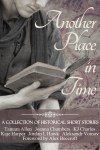 Talking of excellent causes, the anthology Another Place in Time, in which I have a story, has now raised $5K for AllOut. So if you feel like doing some good and stuffing your stocking with some excellent historical romance by a range of terrific authors plus me, clicky clicky.
Talking of excellent causes, the anthology Another Place in Time, in which I have a story, has now raised $5K for AllOut. So if you feel like doing some good and stuffing your stocking with some excellent historical romance by a range of terrific authors plus me, clicky clicky.
 You may also have seen that I have an exciting new magpie logo, courtesy of the marvellous Catherine Dair, and a full brand site revamp thing is underway so I’ll be integrating this blog into my website in the new year. Watch this space.
You may also have seen that I have an exciting new magpie logo, courtesy of the marvellous Catherine Dair, and a full brand site revamp thing is underway so I’ll be integrating this blog into my website in the new year. Watch this space.
And finally, making me very happy, a teaser image for Jackdaw, out in Feb, from the ridiculously talented Lyudmila Tsapaeva.
Right, that’s it, I have fairy lights to untangle. Make sure you don’t accidentally watch Love Actually, beware the sherry, and see you in 2015.

December 12, 2014
Self Editing Tips: Line edits
As I said last week, self editing is no substitute for real editing. If you are self publishing and intend to charge for your work, you should hire a professional editor. I am well aware this can run to significant money, which most of us don’t have to spare. But a lot of the readers stumping up $5 a copy don’t have it to spare either, will resent spending it on a poorly edited or unsatisfactory read, and will be likely to review/make future buying decisions accordingly.
So it makes sense to reduce editorial costs by getting your MS into better shape before you send. I blogged previously on how to have a crack at your own development edits; now we move on to line edits. (Some of this stuff should probably have gone in the development edits blog post, but whatever, it’s here.)
Before we begin: An excellent general tip is to read your MS aloud. You will be amazed how much you’ll spot if you read it out loud–echoes, infelicities, typos, unclear sentences. It takes a while, and may require a solitary room/waiting till the kids’ bedtime, but it’s really worth it. Or, less good but still valuable, read it in a different format. Print it out, or send it to your ereader instead of reading on computer screen. That will defamiliarise the text and allow you to see things that your eyes are used to skimming over.
I have blogged on a lot of these issues before so rather than repeat myself I’ll just link where appropriate.
Speech tags
Small things, big problem. Blog post here. To summarise:
Don’t use thesaurus words (opined, declared, asseverated, proclaimed) when you mean ‘said’.
Don’t use dramatic speech verbs (snarled, snapped) if you haven’t written a snarly or snappy line. If you have, check you need the verb.
Don’t use non-speech verbs (nodded, hesitated, smiled) as speech verbs. I will hurt you. (Exception, as always: funny writing, eg ‘he oiled’ or ‘she oozed’. But do it consciously.)
Don’t overload with unnecessary speech verbs of any kind. You don’t need to tag every line and you can use action to vary the style.
‘Said’ is often called an invisible verb but it can still make its presence felt too strongly, and it is certainly worth taking out when it isn’t doing anything useful. Compare:
“Well, I hope it’s not as boring as the last luncheon,” Stephen said, snuggling down into the bed.
“Well, I hope it’s not as boring as the last luncheon.” Stephen snuggled down into the bed.
‘Said’ is useless there. However, that does not mean you should mark all dialogue with action. That’s agonising.
“I mean, look at this.” The purple-haired editor reached for her pen.
The aspiring writer drummed her fingers on the table.“What do you want me to do, use ‘she nodded’?”
“So help me God, if I see ‘nod’ as a speech verb again…” The editor’s face betrayed her rage and pain.
The writer’s foot was going to sleep. “Is it me or is this conversation taking forever?”
While I’m at it: Please make sure you know how to punctuate speech. I am appalled how many writers get this consistently wrong. It’s time-consuming for an editor to tidy up, and that’s a pure waste of your money.
“My name is Jim.” The man picked up his cup.
=> Two sentences. First sentence ends inside the quote marks.
“My name is Jim,” the man said.
=> One sentence. Speech ends inside quotes, sentence goes on.
And, by analogy:
“What’s your name?” The man picked up his cup.
=> Two sentences. First sentence ends inside the quote marks.
“What’s your name?” the man asked.
=> One sentence. Speech ends inside quotes, sentence goes on.
Pretty straightforward, but if I had a quid for every
“What’s your name?” the man picked up his cup.
“My name is Jim.” The man said.
that I’ve had to fix, I’d be writing this from a beach. Quite seriously, there are more valuable things you can pay a skilled editor to do than insert and remove capital letters.
Names and pronouns
This one is a bugbear of queer romance in particular: the Big Old Mess Of Pronouns.

Don’t ask me for answers. Just look out for it. Remember that the reader will probably link any pronoun back to the previous noun, so if your viewpoint character is Jonah, but the last referent was Ben, Ben’s likely who the pronoun will be stuck to.
It’s tempting to use metonyms like ‘the smaller man’, ‘the blond’ etc in place of names, but this can become obvious and jarring. If doing this, make them earn their place. ‘The smaller man’ is pointless words, but if you frame it as ‘the evasive little bastard’ that gives us a flavour of the POV character’s thoughts. (Again: can easily be overdone.)
Sex scenes
People quite often seem to write these at white heat with a bottle at the elbow, resulting in heavy edits, and nobody likes getting them back full of red pen. Edit them yourself, in sobriety, or you’ll be cringing till your backbone snaps.
This is probably one for its own blog post since every scene has its own demands and every writer her own stylistic issues. Play it out in your head, though, remembering your characters’ relative height, weight and position, to double check that all the bits line up. If you’re using metaphors or euphemisms, keep them under control, and consider that if people actually want to read sex at all, they can probably cope with something a bit more plain-spoken than ‘her intimate dewy petals’.
(While I’m here, can I make a plea for physical plausibility? Limitless priaprism and receptivity in standard-issue humans is just silly, and unintentional silliness kills sexiness dead. As does the reader thinking words like ‘stinging’ and ‘tearing’ and ‘yeast infection’. Do you want your editor to leave comment boxes about this? No, I didn’t think so.)
Metaphors
Look at what your metaphors are doing and don’t pile up inconsistent ones. Thus: if you talk about a character moving with feline or snakelike grace, don’t give him ‘barked’ or ‘growled’ as a speech verb in the same paragraph. If a character has cutting wit in one line, don’t have him asking rapid-fire questions or hammering his point home in the next.
Point of view
If you are directly telling me what a character is feeling/seeing etc, you are in his POV. If you switch to another POV in the same paragraph/scene, you are head hopping, which is jarring for the reader and will cost you a lot of editorial time to fix.

Never, ever, ever switch mid-para like the first example. Never.
Control switching, think about it, and preferably wait for a scene break before switching heads. This isn’t just style guide prescriptiveness. In a good scene of any kind, the reader should be immersed in the story via the POV character. When you switch POV, you jolt the reader out of the immersion, like a train switching tracks, and if you do it badly (so that the reader doesn’t realise you’ve switched heads for a few lines and the action makes no sense), that makes the transition even more distracting. It draws the reader’s attention to the fact that she’s reading a book–which is what you want her to forget.
So if you absolutely must switch POV mid-scene (think carefully about why you need to), at the very least put in a clear line break and do the switch at a significant mid-scene cliffhanger. Multiple switches in a single scene are a really bad idea. And I would be incredibly cautious about switching at all in any intense scene (sex, violence, deep dramatic emotion), when you need the reader totally immersed in the story.
Repetition
A chronic problem and surprisingly hard to see until the book is published, at which point it might as well be in highlighter. Blog post here to avoid, uh, repeating myself.
Continuity
It is a very good idea to keep a list of your characters’ names, physical appearance and quirks, names of businesses/imaginary places, and all those other things. You can waste a lot of everyone’s time randoming whether your heroine’s cutesy business is the Donut Palace, the Doughnut Palace or The Doughnut Palace, or if her sister is Lucy or Lucie, and it’s always embarrassing to discover that you called two other minor characters Lucille and Lucian in the same book.
Pacing
Another one that I can’t summarise here. I will say this: if you find yourself skimming through a stretch of description or a conversation, I expect the reader will too. If your characters are wailing, “Do we have to go over this again?”, ditto. Take your own responses as a guide and see if you can trim or tighten.
Good habits
If you need to cut down editorial costs, sweat the small stuff. Get into the habit of doing things properly. Take, for example, the dash.
Train yourself to type an em dash/double hyphen instead of using a hyphen or spaced hyphen or whatever.
If you’re not sure about how to use em dashes, find a style guide, print out a list, and keep checking it till it’s second nature. Thus, part of yours might read:
Em dash for hesitation, no space “I think–regrettably–you’re right.”
Em dash with space if new sentence “I think– What’s that over there?”
Em dash outside quotes, no cap or full stop, if interrupting “I think”–he handed her a bun–“it’s teatime.”
I know this is tiresome–I’m currently training myself to use double quotes instead of my habitual single, and I resent it bitterly–but if you follow a style sheet and type things like em dashes correctly in the first place, rather than scattering inconsistently spaced hyphens around the text and needing all your broken speech tidied up, you will save editorial time, which is to say, your money.
***
This post just scratches the surface, and doesn’t go anywhere near what an edit should pick up about blocking, pace, length, unconscious prejudice (it happens), character consistency in speech and behaviour, etc etc. But if you want a professional product without breaking the bank, sorting out what you can yourself should cut down considerably on your editorial costs.
_______________________________________
KJ Charles is a freelance editor and Rainbow Award-winning romance writer who has made most of the above mistakes, so I know how you feel.








